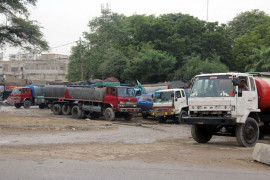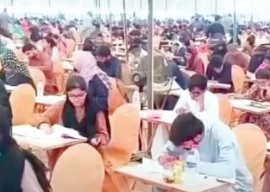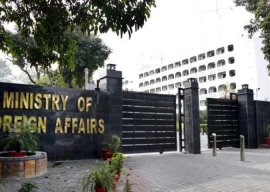
The list was released by Foreign Policy (FP) magazine on Monday, November 26, 2012. This year, FP honoured people who spoke for freedom of speech, for making themselves heard.
Malala was among four Pakistanis who made it to the list this year.
The 15-year-old stood up against the Taliban to fight for her and many girls' right to education. “I shall raise my voice,” she said last year. “If I didn't do it, who would?”
An earlier report by Unesco’s Education for All Global Monitoring Report (EFAGMR) revealed that Pakistan is in the bottom 10 countries, with 62% girls in Pakistan, aged between seven and 15, who have never been to school.
In October, Malala was shot in the head by the Taliban on her way back home from school. She survived the attack and is currently recuperating at Queen Elizabeth Hospital in Birmingham.
Former ambassador to the United States Husain Haqqani and his wife, Farahnaz Ispahani were placed on number 61 on the list “for pushing tough love for their troubled country.”

Photo credit: AFP
Haqqani, who once defended Pakistan’s stance and brokered discussions in order to pacify the US, said in August that the two countries “should stop pretending they are allies and amicably ‘divorce’.”
According to FP, the couple who shares the same slot on the list “spent their careers fighting the slow-motion radicalisation of Pakistan.”
The former ambassador was blamed by a judicial commission to have authored a memo delivered to US officials, seeking assistance to overthrow the military brass of the country.
Branding the controversial memorandum “an authentic document”, the commission – headed by Balochistan High Court Chief Justice Qazi Faez Isa and comprising chief justices of Sindh and Islamabad High Court as its members – pointed out that Haqqani did indeed seek US help — possibly to sell himself as an indispensable asset to the Americans.
His wife, Ispahani, had written in her opinion piece for the Wahington Post this year that there was a “systematic elimination of anyone who stands up to the country’s generals, who have created a militarised Islamist state.”

Photo credit: Express
Following the Memogate controversy, Haqqani resigned from his post as Pakistan’s envoy, while Ispahani’s membership of the Parliament was suspended in a dual nationality case against her.
On number 100 spot on the list is Pakistani blogger Sana Saleem, who made it to the list for “insisting that free speech is not blasphemy.”
Saleem’s campaign against government censorship “Bolo Bhi” landed her a place in the list.
Saleem, in order to push for free speech, fought against a proposal by the government to filter and block URLs by installing a firewall.
She reached out to executives at international companies, asking them not to participate in building firewall and succeeded in making the government shelve the proposal.

Photo: Sana Saleem's Twitter profile
She spoke against the parallels drawn between free speech and blasphemy and in her blog, Mystified Justice, she said “When a state embroils its citizens in an ‘either you are with us or against us’ argument every dissent is at risk of being equated to treason -- or in an Islamic country, blasphemy.”
COMMENTS (59)
Comments are moderated and generally will be posted if they are on-topic and not abusive.
For more information, please see our Comments FAQ




1714558558-0/It-Ends-With-Us-(1)1714558558-0-165x106.webp)


1734857121-0/Untitled-design-(59)1734857121-0-270x192.webp)


1725254039-0/Untitled-design-(24)1725254039-0-270x192.webp)












All the 4 person mentioned (Malalai,Hussain haqani,Asfahani,sana saleem) all are known to pakistanis.
Heyyyyy! These are 4 Pakistanis, from different walks of life, who are on this list. It is something we should be proud of. That three of them are women, makes me feel proud to be a woman & a Pakistani & a Muslim. Instead of being crab-like and pulling down others, why can we not learn to appreciate people even if we disagree with them. That is what our culture, our history, our civilization & our religion teaches us.
As the saying goes "haters always hate." If you cannot be proud of your own countrymen (and women) then maybe you should do what children are told: "Count till ten then speak" Or think before you speak!
So, Finally Malala is being recognized by the world for her thoughts, there are so many people having the same kind of thoughts and nature, but the girl was the one who dared and shared her thoughts using the social media. Social media became a part of our daily lives, whether we do live in karachi, tehran, gaza, newyork or new delhi. It louds your voices.
Thumbs up for he brave girl.
@Majid:
What a stupid and thoughtless thing to tell a girl who was very nearly killed by your "civilized" pot-smoking, gun-toting Taliban brethren. And also it is very disgusting to get so personal as to talk about the girl's private toilet needs. As if you have water when you openly defecate on the rail tracks or outside the village school.
One needs to observe the sanctity of another person's privacy which you, apparently, do not understand, let alone appreciate. How will your country ever return to civilization? Is it going to rot in the stone age forever? You cannot sink beyond the present depth of sordid thinking and behaviour.
Haqqani should audition on sesame street
what about 100s of girls bombed in Gaza????????
@Ammar: I agree with you on Malala. I have said the same in my earlier post. Yes, over-hyped image-building which puts people to unease. I also agree with you on the other girl and Haqqanis. To list them as top Global Thinkers is stupidity to the extreme.
@Parvez: May as well just start calling Pakistanis ex-Indians.
SURB: well said and i think you are right abt the next name on the list.
@ Dear Aryabhat & Raj - USA
The point few others are trying to make in contrast to yours is not against Malala or Sana. The point is that Malala's voice for Education is appreciated by an outcast majority, It's the over-hyped image-building which puts people to unease. As far as the other girl, Im sure 99.99999% never heard her name. As for Huqqanis, they are not known in Pakistan for any service to nation. So putting simply, the list by no means represents "Global Thinkers" and having done anything great for Pakistan. Except Malala, others were highly and justly controversial in the society and Malala too wasn't the reason for start of education in Swat, it was Pak Army and everyone knows it.
@lovePak “Everything, cereals, sweets and are not allowed for us. Only specific Halal meat or Jewish food works.” Hindus also have same difficulties in West – avoiding Beef and any meat as lot of Hindus are vegetarian. Hindus (or Jews or Sikhs) never complain as if this is a great discrimination of some kind. They make food at home or read labels and choose correctly.
“Honestly, do you really think Malala is the reason for more girls starting to attend schools?” Honestly could you tell us WHY Malala was shot at?
“Forcibly convert Hindus??? Hindus renounce their religion to marry some people, they’re not forced to renounce it, marriage just comes with a price.” Ohh Really? Why always Hindus have to pay price when they marry a Muslim?
“Yes Baloch separatists do place body bags here and there but they are funded by foreign elements and use Afghanistan as their base.” – Ohh Really? Is it always that way? Then Why Baloch people are saying they are finding body bags of their own brothers?
“And by the way, if you’re Indian, so do Kashmiris.” I am not Indian but thank you for admitting that Kashmiris are Indians.
“Think IRA, they used violence.” And got what through Violence? Nothing. Guess what Kashmiris will get through violence?
@lovePak: You say: "Forcibly convert Hindus??? Hindus renounce their religion to marry some people, they’re not forced to renounce it, marriage just comes with a price. They can always choose to not marry if they want to keep their faith. And the forcible conversion to Islam is very isolated."
Still keep denying????? These conversions where minor hindu girls who are abducted, repeatedly raped, given a book in hand and asked to say .......... has been going on on a daily basis for the last 65 years and still continuing. What happened to the government's Commission that was set up to probe the cases of forced conversions? They have not come up with any report and are just silent, hoping it will be forgotten. *Nothing is ever heard of even one Hindu girl over all these 65 years of forced conversion and what is her condition a few years after her conversion. She is also not allowed to see her Hindu family. Is anything heard of even one Hindu girl a few years after she has been converted? If so, let us know. What happens to them after conversion? *
All those criticizing Secular India, yes, it is not perfect, but a lot better than any muslim country particularly Pakistan, and no muslim country can ever reach this level of tolerance. In India, even today, Muslims indulge in converting Hindus when they openly talk bad of Hinduism and claim Islam much superior, and this is largely tolerated by the Hindus, not out of fear but out of maturity, unless it reaches extremes. Zakir Naik still says things about Hindus and Hinduism openly and has not been attacked physically. Masjids use loud speakers openly for prayers whereas in Pakistan the Christian family was forced to leave their place because their Muslim neighbors could not bear the sound of drums from the Christian neighbors. Yes Pakistan can criticize India and its secular practices which are not so perfect. But they should do this only after they have reached at least a tenth of the level of toleration and maturity as India.
As far Halal food, it is just a false claim by Muslims. I see Muslims regularly in McDonalds and other fast food chains here relishing Non-Halal food. Recently, I was at the Starbucks where a Bangladeshi family with the woman in Burkha were discussing if they should have lunch at a Chinese restaurant or at McDonalds. In the same area there are a few Pakistaini and Indian restaurants also that serve Halal Food. So, I do not believe it at all when Muslims say that Halal food is compulsory. May be it is in the religion but not practiced. Similarly, I have also seen Hindus eating port and beef here but it is much rare compared to muslims eating non-halal food.
Both Malala and Sana are young girls and not political hacks like Haqqanis but thinking about their country and the young all over Pakistan. Congratulations to both of them and we should be proud of these young girls. More power to you, keep up the good work, country depends on people like you.Lets not forget that Husain Haqqani was involved in mega corruption and his wife knowing fully well that the constitution does not allow dual nationality holders to be in NA,PAs and Senate. They don't represent Pakistan but promote themselves, they must have hoodwinked the organizers.
@poleturtle: What did you expect? List to be full of folks like Musharraf, Mulla Omar and Hafiz Saeed?
They too are thinkers all right, but not the thoughts that western folks will like. This is a list done by a western magazine, will reflect their values.
This will get the talibans knickersinto a twist!
Whoever made this list has done a great disservice to Malala. She deserves credit. No doubt here. But overdoing it will spoil it.
Sana Saleem; seriously? I regular read newspapers and monitor social media, but I barely remember her name from some obscure blog
Read the list carefully! People making to the list are all some working against Muslims and they are know for their enmity towards Islam.
Euhad Barak and Bejmin Natanyahu sharing 13th spot. Salman Rushdie at 33. May be Malala has done more to their cause than Euhad, Benjmin and Rushdie.
Altaf Bhai it is a shame, you need to do more efforts to please your master to get added to this list.
BTW who differs on education for the girls and women rights but we do differ on the education to be provided to a Muslim girl and rights of a Muslim woman.
We are Muslims with Asian culture and the education and rights are given according to norms of the society.
A handful of activists are demanding western education and westren women rights in an Islam and Asian country! Are we ready for that?
@Sheikh Salman: Ever wondered why it is like this.
@Aryabhat
Understand sarcasm my friend, the point is that it has truly become difficult to live as a true Muslim outside of Muslim countries. Not only pork, but most of their other food is also forbidden because in Islam, animals have to be slaughtered in the name of God (btw Jewish food works in that context). Which also makes all food that has meat products forbidden too. And you'll be surprised with how many things have meat in them. Everything, cereals, sweets and are not allowed for us. Only specific Halal meat or Jewish food works. Same goes for alcohol but it's easier to avoid drinking alcohol. One great reason I prefer Pakistan to Canada.
The reason why these people are unwelcome is because they have got attention for doing nothing. Honestly, do you really think Malala is the reason for more girls starting to attend schools? The reason attendance is increasing is because the Taliban had been removed from power in Swat, they were the ones preventing it. It's not because Malala told them to go to school, it's because it became safer for them. Haqqani wouldn't be welcome to any country the way he betrayed Pakistan for a million dollar life in America. Neither would his wife for doing the exact same thing. And the last one is someone hardly anyone has even heard of, and she's welcome.
You are exactly like what the media wants you to be, you are influenced to think the way they want you to think. This is the first time I've ever heard of a girl being shot in Pakistan. And just check out the news, only about 3 or 4 days ago, an American girl (13 yr old) was shot dead in a school bus. Forcibly convert Hindus??? Hindus renounce their religion to marry some people, they're not forced to renounce it, marriage just comes with a price. They can always choose to not marry if they want to keep their faith. And the forcible conversion to Islam is very isolated. Yes Baloch separatists do place body bags here and there but they are funded by foreign elements and use Afghanistan as their base. And by the way, if you're Indian, so do Kashmiris. Their case is far more desperate than Scotland. Think IRA, they used violence.
Who are these Global thinkers? I have never heard of them. In USA no body knows about these four thinkers. Please do not pump up these names
Is that a joke?
I mean seriously?
With Mr.Barack Obama at no.7 ,that's the closets she can get to him.Poor girl ,i feel for her.
Who makes those lists BTW?
May be a group of people who couldn't qualify as thinkers or intellectuals.
I'm expecting President Zardari & Malik Riaz to be in the next list.One at 6 and the other at no.9.
Is somebody missing Altaf bhai?
ha ha ha
Whoever works against Pakistan is Global thinker. Whoever Condemn US for Killing Innocent People are Terrorist.
Malala was shot in head and now facing indirect vilification campaign. Mrs Haqquani have faced vilification as well - from SAME quarters. Guys who hit Malala and who hate Isphahani aren't very different. Birds of same feathers....
However, more then actual FP listing, comments so far in this blog speaks a lot about current state of Pakistan. Not a large majority of Pakistanis lamenting the fatc that people who could stand next to other GLOBAL thinkers are made to feel unsafe or unwelcome on Pakistan....
@Majid, WHO exactly told you they add Wine in curry (yes in some special dish but not really in what YOU call Chicken curry)? or Pork is NATIONAL dish? Yes, they eat Pork, Beef, Lamb, and drink Beer, So what? They at least do not shoot their own Girls in head for saying that they want to go to School! They do not forcibaly convert Hindu Girls and Marry them! They do not leave Body bags in pavements of Edinburgh but discuss separation of Scotland across table! Can you see the difference and why Malala is never coming back to Pakistan?
What negativity? We are filled of hate, revenge & other negative traits. We love you Malala & by the way Hussain Haqqani was a superb ambassador of Pakistan. But we have a habit of not liking outstanding people. We hanged elected PM, we deported an elected PM, we killed a twice elected & first PM.
Why not General Pasha name is here for protecting OBL ? Whereas Taliban Khan name? And what about Qadari? This list is prejuidede and it does not reflect the true Global Thinkers we are producing .
Malala has done A LOT for PEASE in swat BUT I DON't know where exactly it happened in swat AT LEAST not in the area where i live!!
A list of pro USA speakers!! Malala is being used. She is just a child!! Please stop using children for political gains. What Sana Saleem said should put G.W Bush to shame. I remember hearing this statement from him !
Ouch, Burnol for Malala's haters!!
Haqqanis...global thinker...lmao
What a fake list. Bogus and biased. Shame on those who think these people thinkers.
I dream for a Pakistan where every victim gets the same publicity as Malala. But until such time, this extreme PR is an injustice for 40,000 other "normal" Pakistanis killed and hunders of thousds injured.
ottoman i don't think advocating for education is anti Islamic. Those who have stood up against dictators, kings and ruthless killers have always been called as heroes and frankly I don't see anything wrong with it. Malala did what the entire nation was unable to do in 65 years.
Anybody who can think is a thinker. But a 'global' thinker? I don't think so.
Why they have put a little girl with war criminals, dictators and banksters.
All the respect to Malala and else for any good they did but it's a Ridiculous list that they were "Global Thinkers". That says all of the list's credibility. @ Ms Aisha Azeem We Pakistanis (maybe Indians as well) are blind followers of anything madeup like God. Truly speaking, the kid didn't do anything "substantial" which no one else in Pakistan ever did.
Notice the similarity between all these 4. They all helped western interests of destabilizing Pakistan. Malala: The fact that she got so much media attention should give you a clue. She was shot in the head, the western and indeed our own media quickly capitalized and made her such a symbol of education that even questioning the whole episode suddenly meant you are against female education which is rubbish. You might want to note that this weekend, a 13 year old American girl was shot in a school bus and she didn't survive. Coverage: Close to zero!
Haqqani: An open traitor. No explanation needed.
Ispahani: The wife of an open traitor.
Saleem: You should question her desire for "separation of free speech and blasphemy" when she's actually against Julian Assange! Also, how ignorant of her to ignore that without a blasphemy law, Rimsha Masih would probably have been killed. It was this law that allowed the matter to go to court, had it not been there, people would have taken the matter into their own hands.
A reminder that apart from writing blogs, neither Sana Saleem nor Malala Yousafzai have not done anything too practical. Face the facts that Malala's blogs were inaccessible to illiterate girls who don't have computers. And Sana Saleem isn't even that influential in her blogs. Who did practical work? A.S.Edhi for one, as well as several others who are actually doing something for a better Pakistan.
Actually in today's time, anyone who goes against moralities and especially against Islam is an uncontroversial western hero.
well i am going to publish a new list of 10 most influential people, Bilawal zardari will be on the top. ok ? jiska dil chahe list nikal de !
I am happy for you Malala. But I want to tell you since you are used to live in Swat Pakistan and might expect the outer world to be as serene as Pakistan. Pork is the national food and beer (alcohol) is the nation drink of all the EU/ American/ Non-Muslim countries. Moreover they rather use wine to make curry rather than water. Chicken/ Meat is not halal. They do not use water in their toilets. So you might not feel fit in these countries.
Exactly how is Malala a "global thinker"? It makes sense to be a survivor but she's not a thinker.
This girl is so much overhyped!
Great!! Congratulations !!
Aren't Hussain Haqqani and his wife Faranaz Ispahani what our CEC very rightly called ' half Pakistanis '. Very debatable point would be the percentage of Pakistani to American DNA in their systems.
Because of people like Malala,I'm sure Pakistan's future is bright..
You go girl,You were destined to be a trend setter,Super bright future for this talented and daring girl...Love You MALALA :)
Haqqanis who wanted to do memo gate stuff !
What role Mlala played in Foreign Policy?
Ha ha wat a joke... Haqqani's other family members could also be added :).
Is this something to be proud of or does it say something about the deplorable state this medieval country is in?
Is it any wonder Malala can't survive in Pakistan? She is a thinker and thinks Taliban & fundamentalist islamic ideology wrong. Hussain Haqani was critical of Pakistan Army - has been hounded out as well.
So, Wonder how long it will be before other two are hounded out of Pakistan - a place not suitable for radical thinkers.
two countries “should stop pretending they are allies and amicably ‘divorce’.” could he dare to voice the same instance when he was the ambassador for US ? and even a child knows in Pakistan that US and Pakistan never been allies and can never be.
hussain haqqani -- global thinker ??? news to me..